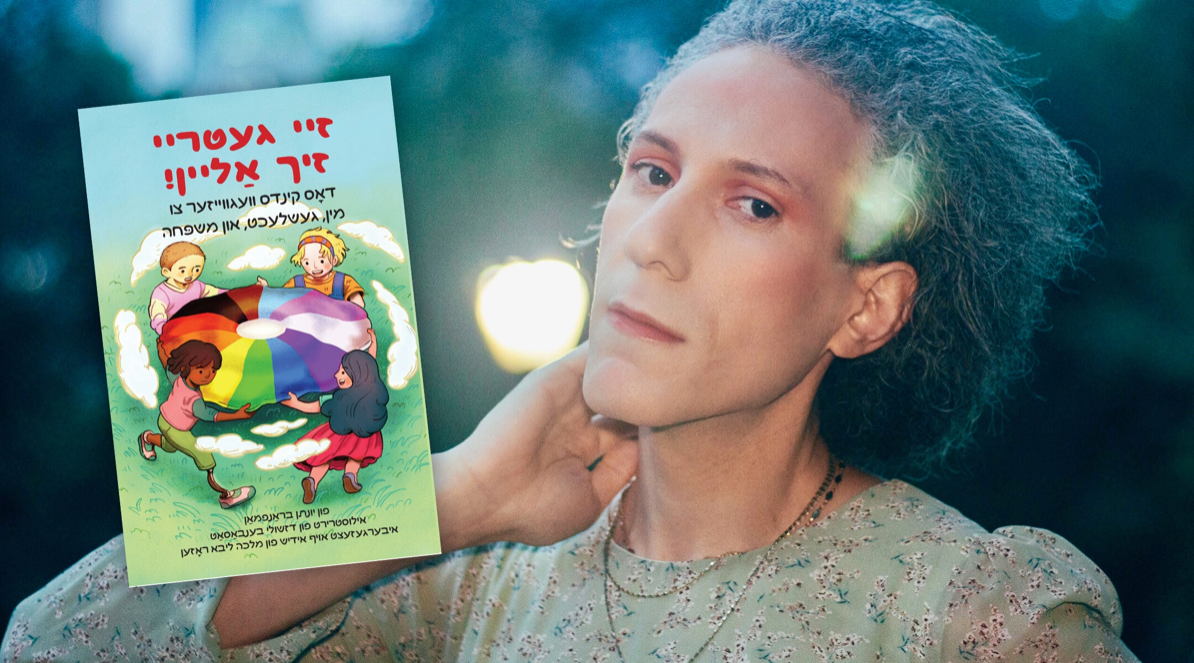Ex-Hasidic, Trans and Brutally Honest, Lili Rosen Invites You to Her ‘Second Circumcision’
The one-woman show is a funny, poignant account of the performer’s transition
Lili Rosen’s new play is both painful and joyous — just like a circumcision.
By PJ Grisar October 17, 2024
Lili Rosen’s one woman show, The Second Circumcision of Lili Rosen, about her gender transition and coming out to her Hasidic family, opens with an act of, well, opening.
“Per my doctor’s orders, I need to dilate three times a day for 30 minutes in order to maintain the aperture and depth of my ‘designer vaginer’ or it will close up with time,” Rosen tells the audience of the process, which involves a series of “medical-grade dildos” of increasing girth.
Dilation, an onerous task that Rosen says is little discussed, even within trans circles, in a way tracks with her life growing up Hasidic in Borough Park, Brooklyn.
…
“My goal is simply to tell my story and perhaps inspire other people with it,” said Rosen. “I feel this obligation, this calling to, because I have a voice, to some extent, to use it on behalf of my trans siblings.”
Perhaps even more important, in a climate that is increasingly hostile to the community, is the need for trans people to tell their own stories “rather than have other people tell our stories for us.”
Rosen’s story isn’t always happy — she’s estranged from much of her family. But it has also given her the joy of finding love and becoming her true self. It is both poignant and affirming and, if you couldn’t tell, quite intimate.
“I mean, it’s a circumcision, right?” Rosen said. “It’s meant to be painful. The process is painful, but it’s still a joyous occasion.”
“God knows that if I as a teenager had access to this, it would have been inordinately helpful and beneficial to me in my journey. I may have even come out 20 years ago, or 30 years ago,” Rosen said. (Courtesy Rosen and Branfman)
Ex-Hassid Who Advised ‘Unorthodox’ Comes Out as Trans
Lili Rosen, the ex-Hasidic Jew who advised popular Netflix series 'Unorthodox,' came out amid her translating a children's sexuality guide into Yiddish
By Shira Hanau/JTA
THE JERUSALEM POST — Among the most challenging decisions Lili Rosen had to make while translating a children’s book about sexuality into Yiddish was what name to put on the cover.
When Rosen began work on “You Be You” in March 2020, she wasn’t yet Lili. She had a long resume of translation and cultural consulting work, including on the Netflix hit show “Unorthodox” and Seth Rogen’s “An American Pickle,” all under the name she had been given by her Hasidic Orthodox parents in Brooklyn when she was identified as male at birth.
But as she translated the book aimed at explaining topics like gender fluidity and sexuality to children during the early months of the pandemic, Rosen found herself considering her own gender identity. By the summer of 2021, she was attending public events in feminine clothing and by the fall had begun to use her new name.
Just a few days before the book went to press for its Jan. 31 release, she decided to use her new name on the cover of the book, marking a major step in coming out publicly as transgender. “Zikh Aleyn Zay Getray,” the Yiddish edition of “You Be You!”, credits translation to Malka Liba Rosen, Rosen’s Yiddish and feminine name.
“When I first started translating it, I didn’t identify as trans,” Rosen said. “It was scary, but also, I waited until that point in time where I felt like I really had no other choice. I could no longer hide from the truth.”
Raised in Hasidic Borough Park as the youngest of five children, Rosen never received any formal sex education as a child or heard anyone talk about gender identity. Her young adulthood included a back and forth pull between periods of intense religiosity and religious apathy, running away from home for a time and eventually leaving the Orthodox community.
But Rosen’s childhood in Hasidic Brooklyn continued to influence her career. She jokes that she transitioned so she could stop playing the role of the rabbi in plays and movies, which she has done multiple times, including on “Unorthodox.” (Her character, Reb Yossele, sought to get the main character to return to Orthodoxy.) That job included writing scenes, coaching actors on Yiddish pronunciation and making sure details of the set and script were accurate.
Nu in Town
Eli Rosen, Hollywood’s Yiddish consultant, on the set of Unorthodox in Berlin
BY ALEXANDRA MARSHALL
“O.K., so this is the scene where Jeff’s character tries to abduct Shira’s character,” explains Eli—pronounced “Elly”—Rosen in between takes. The white earbuds that snake through his long salt-and-pepper beard are plugged into a walkie-talkie where he can hear the barking of the second assistant director. It’s July, and we’re on the Berlin set of Unorthodox, a mini-series (now streaming on Netflix) loosely based on Deborah Feldman’s autobiography about her escape from the Hasidic community in Williamsburg, Brooklyn, to pursue an independent life in Berlin.
Unorthodox’s executive producer Anna LeVine Winger hired Rosen as the show’s Yiddish-language and Hasidic-culture consultant, English-to-Yiddish translator, and co-star. (He also plays a rabbi in the series. And, once a cantor in real life, he lends his voice to the soundtrack.) “The text is actually really powerful and dramatic,” Rosen explains.
This scene, as well as about 50 percent of Unorthodox’s dialogue, is in Yiddish, a language only a couple of the actors had already spoken. As the director, Maria Schrader, calls for a break, the Israeli actress Shira Haas, hair shorn off for the part, comes over to give Rosen an affectionate headbutt. “Nu?” he asks her. She smiles. Rosen gives a thumbs-up to her line delivery. On to the next.
“There’s this burgeoning Yiddish Hasidic arts scene right now. They write their own novels, they make their own movies, they have their own theatre. There is a glot of Yiddish-language Hasidic magazines, newspapers and periodicals – something that didn’t exist when I was growing up.” Yiddish cultural consultant and actor Eli Rosen talks about the changing Hasidic community in New York, his role in the making of the Netflix series Unorthodox, and fulfilling his childhood dream of playing a rabbi. He also discusses his path to performative arts and explains why it makes sense to stage the classics of the European theatre of the absurd in Yiddish – Sławomir Mrożek included.”
THE BINDING
OF ITZIK
“Rosen reveals himself to be a sensitive dramatic actor and a marvelously understated straight man in this unexpected comedy about a man confronting forbidden sexual desires.”
— FORWARD
The Beasts Have Arrived, in a Yiddish ‘Rhinoceros’
by Alexis Sokolsky
The play, originally written in French, is performed in Yiddish, in a new translation by Eli Rosen, who also plays Jean, an early casualty. There are English supertitles, projected onto walls behind the characters, which means that in most scenes non-Yiddish speakers risk eyestrain from trying to watch the actors and read the speeches. But one of the pleasures of the production is hearing the smattering of words that have made their way into English — schmutz, tsoris, shande — and those that are more or less the same in French, English and Yiddish — orgy, epidemic. The Yiddish for rhinoceros is the rather literal nozhorn, which makes up in oomph what it lacks in syllables.
New Yiddish Rep's Masterful Revival of Sholem Asch's Look At Eastern European Jewish Culture in GOD OF VENGEANCE
by Victoria Ordin
Making his theatrical debut as the scribe in the New Yiddish Rep's GOD OF VENGEANCE, real-life lawyer and ex-Hasid Eli Rosen told American Theater's Simi Horowitz that he believes in "transparency": "The only way to effect change is to shine a light on what goes on behind closed doors."… The opportunistic Reb Eli (understudied beautifully by Eli Rosen) has to do some finagling given Yankl's dubious profession. When tragedy strikes in Act III, his counsel is oddly reassuring, though still very much eyes on the prize: the marriage of Rivkeleh to the scholar he's selected for her.
“Early in the writing process, the producers reached out to Eli Rosen, an actor, writer and translator who was raised in a Hasidic family in Borough Park, Brooklyn, and performs with the New Yiddish Repertory Theater in New York. He was impressed that the “Unorthodox” team solicited his involvement well before the scripts were finished, meaning he could help shape the material in a substantive way. “I got the feeling they were taking authenticity seriously,” he says.”
RHINOCEROS: A Masterpiece in Mama Loshen
By Myra Chanin
Another multi-talented artist, Eli Rosen, who stars as Berenger [ed. note: Jean], had been the translator of the Rep’s new Yiddish version. Rosen understands the price paid for being an outsider. He was born into a Brooklyn Hassidic community, is a recovering lawyer who’s now pursuing his lifelong passion for writing and performing.
Eli Rosen’s Jean turns himself into a rhino during a subtle but agonizing transmutation which begins against his will and ends up with his permission.
Eli Rosen and Luzer Twersky are especially commendable for their outstanding performances.
New Yiddish Rep Juxtaposes Hilarity and Heartbreak in English, Hebrew and Yiddish in Hanoch Levin’s Doubleheader
By Myra Chanin
Hanoch Levin is the greatest modern Hebrew playwright and one of the world’s most prolific, having completed 63 plays in the 55 years he was alive. Hanoch Levin Squared is a magical back-to-back New Yiddish Rep presentation of two of Levin tragi-comic tours de force: The Labor of Life and The Whore from Ohio. Both are performed in Levin’s inspired original Hebrew, then also by slightly different casts via Eli Rosen’s comic but poignant Yiddish translations. If you don’t understand Hebrew or Yiddish not to worry, Moshe Lobel’s exquisite English supertitles are clearly readable on the back wall. Lobel and Rosen both grew up in Hassidic Brooklyn households where fluency in Hebrew and Yiddish were givens. In addition, they are both dazzling performers in any language… The next snag is the appearance of Hoibitter’s homeless son Hoimar (Eli Rosen, intensely sad and fiercely annoying in his own translation) who’s convinced he’s the heir to his father’s fortune and wants to make the most of his father’s unused sexual down payment.





